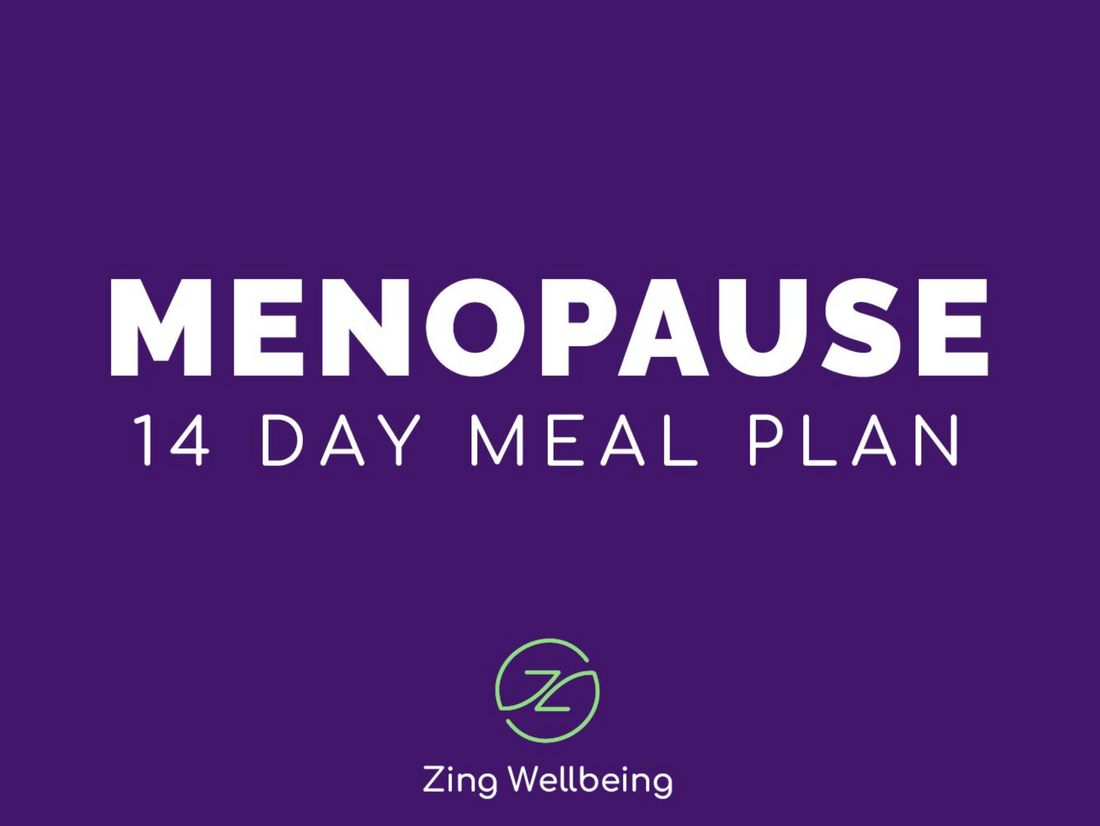
How a Specific Menopause Diet Can Improve Symptoms and Enhance Wellbeing
Menopause is a natural phase in a woman’s life, but the symptoms that come with it can often be challenging.
From hot flashes and night sweats to mood swings and weight gain, the physical and emotional changes can significantly impact a woman’s quality of life. However, diet plays a crucial role in managing these symptoms.
A specific menopause diet, rich in essential nutrients, can help alleviate discomfort and promote overall wellbeing.
In this article, we will explore how a tailored diet can improve menopause symptoms and make women feel so much better during this transition.
And you can also get full access to our menopause meal plan in our Zing Wellbeing membership here
Understanding Menopause and Its Symptoms
Menopause marks the end of a woman’s reproductive years, typically occurring between the ages of 45 and 55. It is characterised by the cessation of menstrual periods for 12 consecutive months.
The hormonal changes, particularly the decline in estrogen and progesterone levels, lead to various symptoms including:
- Hot flashes and night sweats
- Mood swings and irritability
- Weight gain and slowed metabolism
- Insomnia and sleep disturbances
- Fatigue and low energy
- Joint pain and stiffness
- Decreased bone density
The Role of Diet in Managing Menopause Symptoms
A well-balanced diet can have a profound effect on mitigating menopause symptoms and promoting overall health. Here’s how specific dietary changes can make a difference:

And you can also get full access to our menopause meal plan in our Zing Wellbeing membership here
1. Phytoestrogens for Hormonal Balance
Phytoestrogens are plant-based compounds that mimic the effects of estrogen in the body. Incorporating foods rich in phytoestrogens can help balance hormone levels and reduce the severity of hot flashes and night sweats. Foods such as flaxseeds, soybeans, tofu, and tempeh are excellent sources of phytoestrogens.
2. Calcium and Vitamin D for Bone Health
The decline in estrogen during menopause can lead to a decrease in bone density, increasing the risk of osteoporosis. Ensuring adequate intake of calcium and vitamin D is essential for maintaining strong bones. Dairy products, leafy green vegetables, almonds, and fortified foods are rich in calcium, while sunlight exposure and fortified foods can help meet vitamin D needs.
3. Omega-3 Fatty Acids for Heart Health
Menopause increases the risk of cardiovascular diseases due to changes in cholesterol levels and increased blood pressure. Omega-3 fatty acids, found in fatty fish (such as salmon and mackerel), chia seeds, and walnuts, can help improve heart health by reducing inflammation, lowering blood pressure, and improving cholesterol profiles.
4. High-Fibre Foods for Weight Management and Digestive Health
A slower metabolism and hormonal changes during menopause can lead to weight gain. A diet high in fibre helps manage weight by promoting satiety and supporting digestive health. Whole grains, fruits, vegetables, legumes, and seeds are excellent sources of dietary fibre.
5. Antioxidants for Reduced Inflammation and Enhanced Skin Health
Antioxidant-rich foods can combat oxidative stress and reduce inflammation, which is beneficial for overall health and skin health during menopause. Berries, nuts, seeds, dark chocolate, and colorful vegetables like carrots and bell peppers are rich in antioxidants.
6. Protein for Muscle Mass Maintenance
Muscle mass naturally declines with age, and menopause can accelerate this process. Including adequate protein in the diet helps maintain muscle mass and strength. Lean meats, poultry, fish, eggs, dairy products, beans, and lentils are excellent protein sources.
7. Hydration for Overall Wellbeing
Staying hydrated is crucial during menopause to help manage symptoms like dry skin, fatigue, and urinary problems. Drinking plenty of water and consuming hydrating foods such as cucumbers, watermelon, and oranges can help maintain optimal hydration levels.
Sample Menopause-Friendly Meal Plan
Here’s a sample day of a menopause-friendly meal plan to illustrate how these dietary principles can be incorporated into daily meals:
Breakfast:
- Greek yogurt with flaxseeds, chia seeds, and fresh berries
- A glass of fortified orange juice
Lunch:
- Grilled salmon salad with mixed greens, cherry tomatoes, avocado, and a lemon-olive oil dressing
- A slice of whole grain bread
Snack:
- A handful of almonds and an apple
Dinner:
- Stir-fried tofu with broccoli, bell peppers, and quinoa
- A side of steamed spinach
Snack:
- Dark chocolate square and a cup of herbal tea
And you can also get full access to our menopause meal plan in our Zing Wellbeing membership here

A specific menopause diet, rich in phytoestrogens, calcium, vitamin D, omega-3 fatty acids, fibre, antioxidants, and protein, can significantly improve menopause symptoms and enhance overall wellbeing.
By making mindful dietary choices, women can navigate this life transition more comfortably and maintain their health and vitality. Remember, it’s always a good idea to consult with a healthcare provider or a nutritionist to tailor dietary changes to individual needs and health conditions.
Embrace the power of nutrition to feel better and live a vibrant life during menopause and beyond.

If you have any feedback for the Zing Wellbeing team please shoot them over to us HERE, we always love to hear from you.
And you can check out our Zing Wellbeing program here
Thank you so much for being here.
Rhian xx

